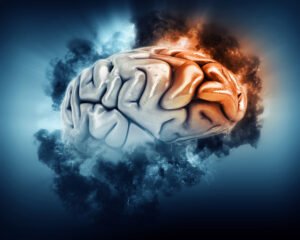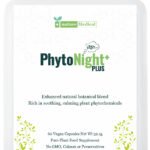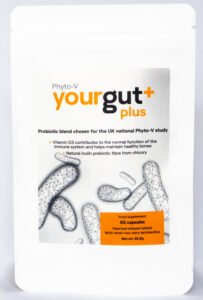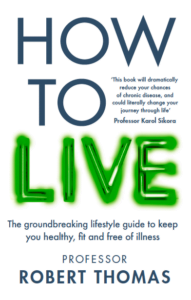Self-help strategies to help fight fatigue
 .
.
Chronic fatigue has profound effects on both physical and emotional well-being and can have a phenomenal impact on a patient’s quality of life, interfering with daily activities and having potentially devastating social and financial consequences [Thomas].
Fatigue is common and can have a number of causes, either on their own or more commonly in combination:
- Post viral syndrome
- Post vaccination syndrome
- Cancer related fatigue
- Lack of sleep
- Poor gut health
- Excessive unaccustomed exercise
- Thyroid deficiency
- Anaemia
- Sedating drugs
- Depression/ low mood
- Alcohol or recreational drug abuse
 Post viral syndrome is common after covid and can include fatigue, brain fog and ongoing gut problems. It but can also occur after other viral infections. The strategies below can help some people whatever the cause particularly the emphasis on improving gut health. The major UK national study demonstrated a clear significant benefit, in terms of fatigue and overall well being for Yourgutplus+ a combination of lactobacillus probiotics with inulin and vitamin D and an even greater benefit if combined with Phyto-v a specifically designed phytochemical rich supplement... read more
Post viral syndrome is common after covid and can include fatigue, brain fog and ongoing gut problems. It but can also occur after other viral infections. The strategies below can help some people whatever the cause particularly the emphasis on improving gut health. The major UK national study demonstrated a clear significant benefit, in terms of fatigue and overall well being for Yourgutplus+ a combination of lactobacillus probiotics with inulin and vitamin D and an even greater benefit if combined with Phyto-v a specifically designed phytochemical rich supplement... read more
Post vaccine syndrome: Vaccines, in statistical terms, are very safe and are a vital method to avoid serious infections not only for yourself but others around you. Some people, do have a chronic reaction against them which includes a chronic fatigue. A recent study published in the BMJ reported hat people with poor gut health are more likely to develop averse reactions to vaccines and at the same time, not get as much benefit. For this reason the probiotic covid vaccine study was designed as is currently recruiting in the UK … read more
Cancer Related Fatigue (CRF) has overtaken nausea and pain as the most distressing symptom experienced by patients during and after their anticancer therapies. Between 60 to 96% of patients report CRF during chemotherapy, radiotherapy or after surgery, and post-treatment fatigue syndrome has been shown to last for up to 12 months [Thomas]. CRF can even hinder a patient’s chance of remission or cure if it affects compliance with treatment [Wagner]. The precise aetiology of chronic or cancer-related fatigue is not fully understood, but researchers have linked it to chronic inflammation and excess oxidative stress – so strategies to support anti-oxidant enzymes, reduce inflammation and reduce oxidative attack on the body seem very sensible [Logan].
Management of Chronic Fatigue
Medical treatments: Associated aggravating medical conditions should be looked into and treated if possible. The most obvious include anaemia, electrolyte imbalance and liver and renal failure, while drugs used for medical treatment such as opiates, antihistamines, anti-sickness medication and sedatives should also be investigated [Thomas]. Both medical conditions and certain drugs can cause symptoms such as anxiety, depression, nocturia, pain, restless legs, night sweats and pruritus, which can disturb sleep patterns and lead to fatigue in the day [Thomas].
In general, medical treatments for chronic fatigue have had limited success. Psycho-stimulants such as the amphetamine salts dextroamphetamine and levoamphetamine (Adderall), or methylphenidate (Ritalin), a drug licensed for deficit hyperactivity disorder and narcolepsy, have been shown to improve fatigue and concentration in the short-term but can induce insomnia and agitation with long term use, aggravating chronic fatigue syndromes [Yancey]. Caffeine is the most commonly used self-administered drug, but this only offers a short term fix, does not help chronic fatigue and often makes it worse by impairing sleep [Greenlee].
Integrative strategies (non-nutritional): Activities aimed at reducing stress such as relaxation classes, yoga and massage have been shown to improve sleep patterns when used in conjunction with other sleep hygiene strategies and help ease fatigue [Bower, Garssen]. Regular Qigong, a Chinese system of breathing techniques, posture and stretching has been shown to help in the management of fatigue [Chen, Deng], while therapist-delivered acupuncture and Cognitive Behavior Therapy has also been shown to have a benefit [Molassiotis, Price].



Supplements with proven benefit:
Probiotics: The yourgutplus+ supplement was tested in a double blind randomised trial involving patients with chronic fatigue as part of their long covid syndrome. It demonstrated a significant benefit especially if taken for the longer term. Benefit which even greater among patients who were randomised to take the additional phyto-v phytochemical rich supplement [Read more]. In one study, Lactobacillus acidophilus were given to patients with high fatigue severity scores and high disability scores. After four weeks, both health and physical activity improved when measured with Visual Analogue Scales and the SF-12 Health Survey [Sullivan A]. In another small randomised study involving people with fatigue and irritable bowel syndrome, bowel symptoms and emotional wellbeing improved within the probiotic group [Roa]. Although further trials are required to confirm these findings, the myriad of health benefits offered by probiotics means they should certainly be considered for use in treating fatigue. It is important to note they should be from a trusted and reliable source which produce capsules which have been tested for safety in ethically approved national trials.


Supplements with possible benefits
Ginseng (Panax quinquefolius) has long been used in traditional Chinese medicine as a natural energy enhancer. It can be added to meals or drank in teas but, in terms of scientific investigation, laboratory or clinical trials have concentrated it into nutritional supplements. Ginseng’s active ingredients, ginsenosides, have been shown in animal studies to reduce cytokines related to inflammation and to help regulate cortisol levels, both of which play a role in fatigue [Greenlee]. Its potential benefits for cancer-related fatigue in humans were investigated in a double-blind randomised trial which recruited 364 patients from forty US-based community hospitals. Participants took either a capsule containing 2000mg of ginseng (standardised to 3% ginsenosides) or a placebo. After eight weeks, a significant improvement in fatigue was seen among the group which had taken the ginseng supplement. It should be noted that this study used a whole root product, not ginseng methanolic extract commonly used in over the counter supplements and which has demonstrated estrogenic effects in breast cancer cell lines [King].
Supplements unlikely to have benefits
Guarana (Paullinia cupana), is a plant in the maple family that grows along the Amazon and is common in Brazil. Guarana is commonly used as a stimulant and contains about twice the amount of caffeine found in a coffee bean. It also contains theobromine and theophylline, stimulants that affect the central nervous system. Well-conducted RCTs evaluating Guarana have yet to be published [da Greenlee, Costa Miranda, de Oliveira Campos].
Carnitine is essential for mitochondrial energy production. Disturbance in mitochondrial function may contribute to or cause the fatigue seen in Chronic Fatigue Syndrome (CFS) patients. Previous investigations have reported decreased carnitine levels in people suffering from CFS. However, a meta-analysis of twelve of the best studies, published in 2017, did not support the use of carnitine supplementation for cancer-related fatigue.
Various vitamins and minerals are only likely to help if correcting a known deficiency [Greenlee] confirmed by a micronutrient test. Melatonin (0.5 to 3 mg, 5 to 8 hours before bedtime) has been shown to improve fatigue symptoms among people with Chronic Fatigue Syndrome with poor sleep patterns [van Heukelom], but its impact has yet to be investigated in patients post-cancer [Greenlee]. A small study of polyphenol-rich, sugar-free cocoa did demonstrate an improvement in the functional disability caused by fatigue, but further confirmatory trials are required [Sathyapalan].
- Sisto SA, LaManca J, Cordero DL et al Metabolic and cardiovascular effects of a progressive exercise test in patients with chronic fatigue syndrome. Am J Med. 1996;100(6):634-40.
- Van Waart H, Stuiver MM, Van Harten WH et al Effect of Low-Intensity Physical Activity and Moderate- to High-Intensity Physical Exercise During Adjuvant Chemotherapy on Physical Fitness, Fatigue, and Chemotherapy Completion Rates: Results of the PACES Randomized Clinical Trial. 2015 JCO 2015, 33 (33); doi. 10.1200/JCO.2014.59.108
- Manuel Y, Moorkens G, Vertommen J et al Magnesium status and parameters of the oxidant-antioxidant balance in patients with chronic fatigue: effects of supplementation with magnesium. J Am Coll Nutr. 2000; 19(3): 374-382.
- Wilmore JH and Costill DL. (2005) Physiology of Sport and Exercise: 3rd Edition. Champaign, IL: Human Kinetics
- Werbach MR. Nutritional strategies for treating chronic fatigue. Altern Med Rev 2000; 5(2):93-108.
- Logan AC, Wong C. Chronic fatigue syndrome: oxidative stress and dietary modifications Altern Med Rev. 2001 6(5): 450-9.
- Sathyapalan T, Beckett S, Rigby A et al. High cocoa polyphenol rich chocolate may reduce the burden of the symptoms in Chronic fatigue syndrome. Nutrition Journal 2010, 9;55, pp2-8.
- Sullivan A, Nord C, Nord C et Nutrition Journal 2009, 8:4. Effect of supplement with lactic-acid producing bacteria on fatigue and physical activity in patients with chronic fatigue syndrome
- Rao AV, Bested AC, Beaulne TM et al A randomized, double-blind, placebo-controlled pilot study of a probiotic in emotional symptoms of chronic fatigue syndrome Gut Pathog. 2009; 1: 6.
- Price JR, Mitchell E, Tidy E, Hunot V. Cognitive behaviour therapy for chronic fatigue syndrome in adults. Cochrane Database Syst Rev. 2008(3):CD001027.
- Thomas R, A. Makris, D. Bloomfield, A.M. Moody, M. Williams. Giving patients a choice improves quality of life: A multi-centre, investigator-blind, randomised, crossover study comparing letrozole with anastrozole. Clinical Oncology (2004) 16: 485-491.
- Thomas R Anaemia fatigue and Epoeitin in Oncology. British Journal of Cancer Management. Vol.2 April No. 4, 2005.
- Bower JE, Garet D, Sternlieb B, et al. Yoga for persistent fatigue in breast cancer survivors: a randomized controlled trial. Cancer. 2012;118(15):3766–3775.
- Yancey J, Thomas S. Chronic Fatigue Syndrome: Diagnosis and Treatment. American Family Physician. 2012;86(8)741-6.
- van Heukelom RO, Prins JB, Smits MG, Bleijenberg G. Influence of melatonin on fatigue severity in patients with chronic fatigue syndrome and late melatonin secretion. Eur J Neurol. 2006;13:55-60.
- Hobday RA, Thomas S, O’Donovan A, Murphy M, Pinching AJ. Dietary intervention in chronic fatigue syndrome. J Hum Nutr Diet. 2008;21(2):141-9.
- Molassiotis A, Bardy J, Finnegan-John J, et al. A randomized, controlled trial of acupuncture self-needling as maintenance therapy for cancer-related fatigue after therapist-delivered acupuncture. Ann Oncol. 2013;24(6):1645–1652.
- da Costa Miranda V, Trufelli DC, Santos J, et al. Effectiveness of guaran (Paullinia cupana) for postradiation fatigue and depression: results of a pilot double-blind randomized study. J Altern Complement Med. 2009;15(4):431–433.
- de Oliveira Campos MP, Riechelmann R, Martins LC, Hassan BJ, Casa FB, Del Giglio A. Guarana (Paullinia cupana) improves fatigue in breast cancer patients undergoing systemic chemotherapy. J Altern Complement Med. 2011;17(6):505–512.
- Greenlee H, Balneaves L, Carlson L et al. Clinical Practice Guidelines on the Use of Integrative Therapies as Supportive Care in Patients Treated for Breast Cancer. Journal of the National Cancer Institute Monographs, No. 50, 2014 346-351.
- Chen Z, Meng Z, Milbury K, et al. Qigong improves quality of life in women undergoing radiotherapy for breast cancer: results of a randomized controlled trial. Cancer. 2013;119(9):1690–1698.
- Deng G, Chan Y, Sjoberg D, et al. Acupuncture for the treatment of post- chemotherapy chronic fatigue: a randomized, blinded, sham-controlled trial. Support Care Cancer. 2013;21(6):1735–1741.
- Garssen B, Boomsma MF, Meezenbroek EJ, et al. Stress management training for breast cancer surgery patients. Psychooncology. 2013;22(3):572–580.
- Barton DL, Liu H, Dakhil SR, et al. Wisconsin Ginseng (Panax quinque- folius) to improve cancer-related fatigue: a randomized, double-blind trial, N07C2. J Natl Cancer Inst. 2013;105(16):1230–1238.
- King ML, Adler SR, Murphy LL. Extraction-dependent effects of American ginseng (Panax quinquefolium) on human breast cancer cell proliferation and estrogen receptor activation. Integr Cancer Ther. 2006;5(3):236–243.
- Groeger D, O’Mahony L, Murphy EF et al Bifidobacterium infantis 35624 modulates host inflammatory processes beyond the gut. Gut Microbes. 2013 Jul-Aug;4(4):325-39. doi: 10.4161/gmic.25487. Epub 2013 Jun 21.
- Velthuis MJ, Agasi-Idenburg SC, Aufdemkampe G, Wittink HM. The effect of physical exercise on cancer-related fatigue during cancer treatment: a meta-analysis of Randomised Controlled Trials Clinical Oncology, 2009 Clin Oncol (R Coll Radiol). 2010 Apr;22(3):208-21. doi: 10.1016/j.clon.2009.12.005.
- Cramp F, Daniel J. Exercise for the management of cancer-related fatigue in adults. Cochrane. Database. Syst.Rev. 2008;CD006145
- Lucia A, Earnest C, Perez M. Cancer-related fatigue: can exercise physiology assist oncologists? Lancet Oncol. 2003;4:616-625.
- Wagner LI, Cella D. Fatigue and cancer: causes, prevalence and treatment approaches. Br.J.Cancer. 2004;91:822-828.
- McNeely ML, Campbell KL, Rowe BH, Klassen TP, Mackey JR,Courneya KS. Effects of exercise on breast cancer patients and survivors: a systematic review and meta analysis. CMAJ. 2006;175:34-41.
- Roy S, Sherman A, Monari-Sparks MJ, et al. Correction of low vitamin D improves fatigue: effect of correction of low vitamin D in fatigue study (EViDiF Study). N Am J Med Sci 2014;6:396–402.
- Nowak A, Boesch L, Andres E, Battegay E, Hornemann T, Schmid C, Bischoff-Ferrari HA, Suter PM, Krayenbuehl PA. Effect of vitamin D3 on self-perceived fatigue: A double-blind randomized placebo-controlled trial. Medicine (Baltimore). 2016 Dec;95(52):e5353. doi: 10.1097/MD.0000000000005353.
